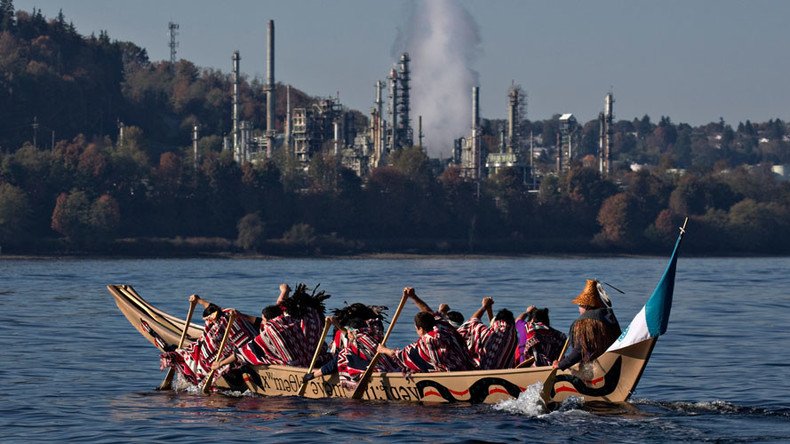Canada’s energy regulator approves Trans Mountain pipeline despite First Nation, Green backlash

Human rights, tribal resources and the death of endangered species aside, Canada’s energy regulators think it’s a great idea to greenlight an oil shipping lane that would boost transportation sevenfold. The project is facing fierce opposition.
The National Energy Board ended up recommending the Trudeau government go ahead with the Trans Mountain oil sands pipeline – a CA$6.8 billion Canadian (US$5.4 billion) project that will run through the Salish Sea and boost pipeline capacity from 300,000 to 890,000 barrels of crude a day. The shipping lane will be used to carry Alberta’s oil over to British Columbia, to then be loaded onto tankers for export to the US and Asia. When (and if) complete, the project will see 350 additional tankers annually travel those waters. The federal government now has seven months to reach a final decision.
We're pleased with #NEB's recommendation. Looking ahead to next steps & having expanded pipeline operating in 2019. https://t.co/FqFY2eAa4B
— Trans Mountain (@TransMtn) May 20, 2016
The support given by the energy sector hinges on 157 conditions, 49 of them to do with the environment. The NEB believes those are achievable, and that the pros outweigh the cons; the pipeline promises thousands of new jobs, increased government revenue and access to new export markets, the CBC reports.
All of this comes in the face of serious opposition by environmental advocates, as well as Canadian and American tribal groups and the Green Party. The protests come amid widespread concerns for the environment – including greenhouse gases, untold risks to the endangered Orca whale population, local tribal resources and the increased possibility of an oil spill, as well as a small risk of an earthquake.
READ MORE: Canada eyeing Asian markets for its oil
"The NEB has completely disregarded the urgency that climate science demands. We can't build more pipelines and meet the international climate commitments that Canada agreed to in Paris," Mike Hudema of Greenpeace said in a statement.
The sentiment was shared by Green Party leader Elizabeth May.
The NEB just gave their approval to #KinderMorgan. Make sure the gov't hears from you too: https://t.co/u3PDZA0pr2pic.twitter.com/8w3XPgS8Tt
— Green Party Canada (@CanadianGreens) May 19, 2016
"The Liberals promised to fix the environmental review process, but have so far only put in a temporary fix, a three-member panel to review the NEB's Trans Mountain report. We must return to an independent, robust environmental assessment process for all industry projects. Anything less sets a dangerous precedent."
We will stop #KinderMorgan. Unacceptable risk to our coasts, our whales, our salmon - and yes, to jobs at Chevron refinery. #GPC#notankers
— Elizabeth May (@ElizabethMay) May 19, 2016
Nevertheless, "The board considered the concerns expressed by Indigenous groups, how the project and related tanker traffic could impact Indigenous interests, and the appropriate means of mitigating such impacts," said Robert Steedman, the NEB's chief environment officer.
But the aboriginal communities are not impressed, and are threatening court action to prevent the pipeline from happening.
According to the Guardian, several Washington State tribal leaders have joined the fight over in Canada, alleging that not only the environment, but the entire tribal ways of life and culture would also suffer, along with their fishing rights, protected by a US treaty.
READ MORE: Pipeline leaks will continue due to reliance on bad welds – TransCanada whistleblower
“We are facing the very real threat of an oil spill that puts the Salish Sea at risk,” chairman of the Tulalip Tribes, Mel Sheldon, said. “The fishing grounds of the Salish Sea are the lifeblood of our peoples. We cannot sit idly by while these waters are threatened by reckless increases in oil tanker traffic and the increased risk of catastrophic oil spills.”
But the NEB appears resolute. Part of the conditions it requires Kinder Morgan to fulfill is release a greenhouse assessment within two months of the pipeline being built to account for construction emissions. The NEB will then require the firm to offset them.
If the Project proceeds, #TransMountain would be required to continue consulting with #Indigenous groups throughout the life of the Project
— NEB Canada (@NEBCanada) May 19, 2016
Furthermore, the energy regulator is said to have strayed outside its normal area of expertise, as it set about recommending the preferred means for the oil to be transported.
The pipeline will further have to enhance its marine oil spill response capabilities, to be able to deliver 20,000 tons within 36 hours of a potential spill.
There is also a mammal protection program in the works.
"The board found that marine traffic in the Salish Sea is high and is increasing and, in fact, will increase regardless whether or not the project proceeds. And it found in the case of the southern resident killer whales, they are already impacted by the levels of traffic and any additional traffic that might be introduced by the Trans Mountain expansion project would likely be significant," Steedman said.












